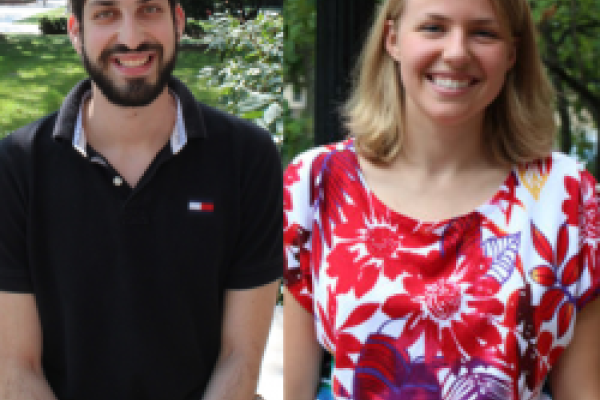NSF Graduate Research Fellowship Program Winners

Graduate students Nicole Yadon (American Politics) and Dan Silverman (Comparative Politics) have stood out as top scholars across the nation through their recent recognition by the National Science Foundation. Yadon was given the honor of winning in the 2013 NSF Graduate Research Fellowship Program competition and Silverman the distinction of honorable mention.
To put these achievements in proper perspective, there were over 13000 applications across all eligible disciplines in this cycle; 2000 received an award and 1762 an honorable mention. Yadon is one of 16 political scientists being awarded; Silverman is one of 15 political scientists receiving an honorable mention.
Yadon’s proposal examined the issue of racial inequality in a “post-racial” era. She explains, “Minorities have unequal access to resources like housing, employment, and education. Scholars have identified racial priming as a strategy political elites use to highlight racial issues in an attempt to mobilize White racial resentment. Looking at different kinds of White Americans, however, may reveal less resentment towards minorities. Research suggests that White women may be more racially liberal (supportive of policies associated with minorities) than White men.” She will be using her fellowship to test if this is true and if she finds that it is, to examine why. The goal of her research is to help our understanding of politics, inequality, and gender differences. It will help illuminate perceptions of race within and across racial and ethnic groups. Gaining a better understanding of gender will also help explain party identification and differential attitudes towards policies like social welfare. Additionally, it has implications for minority politicians. Yadon attributes part of her success to having the opportunity to work closely with two of our faculty members, Corrine McConnaughy and Ismail White.
Silverman's proposal asked why the behavior of militaries ordered to crush mass uprisings has varied so widely, from Tahrir to Tiananmen and beyond, with such profound consequences for their societies. He hypothesized that the military's behavior is a product of the coup-proofing strategies -- ethnic favoritism, economic patronage, and regime coercion -- used by the regime on its leadership and rank-and-file, and proposed to examine these hypotheses by conducting semi-structured interviews with retired officers and expert observers, constructing a game theoretic model of military decision-making, and building a qualitative dataset of military-level variables that could be used in models of regime change as well as interstate and intrastate conflict.
The work of these students is important not only to the discipline of Political Science but to also broaden our understanding of societal issues and their implications in government. Congratulations Nicole and Dan!
